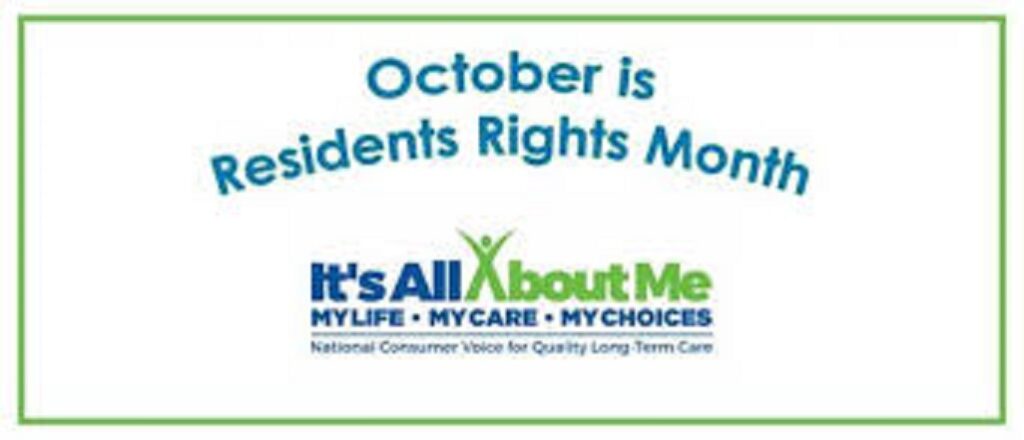CHICAGO, IL – Each day, families bring their loved ones to be admitted into nursing homes across the country. Some may feel uncertain about their loved one receiving the quality care they deserve. Unfortunately, in many nursing home facilities there are track records of willful neglect, abuse, and preventable accidents and illnesses. October is a time to remind families the rights residents have that are designed to protect them from these situations.
“Resident’s Rights Month” is an annual event held by the National Consumer Voice for Quality Long-Term Care (Consumer Voice) to celebrate and focus the public’s attention on awareness of dignity, respect, and long-term resident’s value. Resident’s Rights Month is an opportunity for families, residents, staff, ombudsman programs, and other advocates to promote quality long-term care.
Review of Nursing Home Resident’s Rights
Residents in nursing homes have rights that are guaranteed under federal law. The Nursing Home Reform Law requires nursing homes to promote and protect the rights of each individual resident and stresses individual dignity and self-determination. Many states include residents’ rights in state law or regulation but varies by state.
- Right to a Dignified Existence
- Equal access to quality care
- Be treated with consideration, dignity, and respect, recognizing each resident’s individuality
- Freedom from abuse, neglect, exploitation, and misappropriation of property
- Freedom from physical or chemical restraints
- Quality of life is maintained or improved
- Exercise rights without interference, coercion, discrimination, or reprisal
- Provide a homelike environment, and use of personal belongings when permitted
- Security of possessions
- Right to Self-Determination
- Reasonable accommodation of needs and preferences
- Organize and participate in resident and family groups
- Request, refuse, and/or discontinue treatment
- Choice of activities, schedules, health care, and providers, including attending physician
- Participate in developing and implementing a person-centered plan of care that incorporates personal and cultural preferences
- Choice of designating a representative to exercise his or her rights
- Right to be Fully Informed Of
- Rules and regulations, including a written copy of residents’ rights
- The type of care to be provided, and risks and benefits of proposed treatments
- Contact information for the long-term care ombudsman program and that state survey agency
- Changes to the plan of care, or in medical or health status
- State survey reports and the nursing facility’s plan of correction
- Written notice before a change in room or roommate
- Notices and information in a language or manner he or she understands (Spanish, Braille, etc.)
- Right to Raise Grievances
- Present grievances without discrimination or retaliation, or the fear of it
- Prompt efforts by the facility to resolve grievances, and provide a written decision upon request
- To file a complaint with the long-term care ombudsman program or state survey agency
- Right of Access to
- Individuals, services, community members, and activities inside and outside the facility
- Assistance if sensory impairments exist
- Visitors of his or her choosing, at any time, and the right to refuse visitors
- Personal and medical records
- His/her personal physician and representatives from the state survey agency and long-term care ombudsman program
- Participate in social, religious, and community activities
- Rights Regarding Financial Affairs
- Manage his/her financial affairs
- Information about available services and charges for each service
- Personal funds of more than $100 ($50 for residents whose care is funded by Medicaid) deposited by the facility in a separate interest-bearing account, and financial statements quarterly or upon request
- Not be charged for services covered by Medicaid or Medicare
- Right to Privacy
- Private and unrestricted communication with any person of their choice
- Regarding personal, financial, and medical affairs
- During treatment and care of personal needs
- Rights During Discharge/Transfer
- Preparation and orientation to ensure safe and orderly transfer or discharge
- Right to appeal the proposed transfer or discharge and not be discharged while an appeal is pending
- Receive 30-day written notice of discharge or transfer that include: the reason; the effective date; the location going to; appeal rights and process for filing an appeal; and the name and contact information for the long-term care ombudsman
- Notice of the right to return to the facility after hospitalization or therapeutic leave
Dinizulu Law Group: Illinois Nursing Home Abuse and Neglect Attorney’s
If you or your loved one has been subjected to poor treatment while in a nursing home facility, our attorneys can help find the answers for you. Contact our skilled legal team at Dinizulu Law Group to discuss your concerns. Call us at (312) 384-1920 for a free consultation or visit our website for more information.



